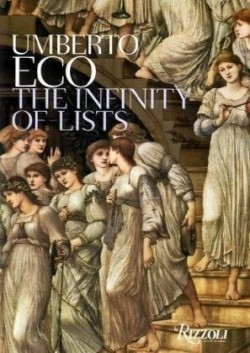
The Infinity of Lists
An Illustrated Essay
Umberto Eco is a world renowned medievalist, philosopher, semiotician, literary critic, and currently the president of the Scuola Superiore di Studi Umanistici, University of Bologna. A frequent contributor to the popular press, Eco has written two children’s books, and is a successful novelist and essayist. His best-known novels are The Name of the Rose and Foucault’s Pendulum. Eco, however, confessed in an interview in 1996 that The Name of the Rose may be a book more unread that read. “It happens,” he said. “When The Name of the Rose came out, so difficult and full of Latin quotations…” Still, he is “content.” The book has sold more than fifty million copies.
This latest venture is a byproduct of a series of conferences and exhibitions he was asked to organize at the Louvre. The topic was open to his discretion, and without hesitation, he chose the list.
Now, readers of Eco’s novels can hardly help noticing that the man has a predilection for listing. But the list form seems, from a casual glance, outside Eco’s preference toward literary texts that are open and encourage a connection between the reader and society at large. According to Eco, literature is at its best when it resonates with context, rather than closing itself down to a single, unalterable meaning. How can a list—the naming of objects or qualities—engage outside its frame? How can a list be infinite and still be something that fits on a page or a canvas?
The notion that infinity can continue beyond the frame, says Eco, first appeared in Western literature in Homer’s catalogue of ships, and the way to achieve infinity is to suggest that the list does not end.
So from the polish’d arms, and brazen shields,
A gleamy splendour flash’d along the fields.
Not less their number than the embodied cranes,
Or milk-white swans in Asius’ watery plains…
To count them all, demands a thousand tongues,
A throat of brass, and adamantine lungs.
Daughters of Jove, assist! inspired by you
The mighty labour dauntless I pursue;
What crowded armies, from what climes they bring,
Their names, their numbers, and their chiefs I sing.
And so Homer will, for another 350 verses.
The list, says Eco, “turns up again in the Middle Ages…and especially in the modern and post-modern world; a sign that we are subject to the infinity of lists for many diverse reasons.”
Using examples of art from the Louvre and other collections around the world, plus lengthy (in a good way) excerpts from texts, Eco catalogues the catalogue. There is the Visual List with its intention to create the effect of abundance, over-abundance, overflowing the frame, as in Bosch’s The Garden of Earthly Delights, Dutch still lifes, or Ravel’s Bolero.
In another chapter, the Ineffable is suggested by giving examples, then leaving the rest to the imagination, like Assumption of the Virgin by Correggio or this list of Christian demons.
Aamon, Abigor, Abracace, Adramelech, Agares, Aguare, Aivion, Alastorr, Alloces, Amduscias, Amon, Amy, Aarazel, Andras, Andras, Arioch, Andrealphus, Andromalius, Asmoday, Astaroth, Aubras, Azazel, Baalzefon, Bael, Baelbalan, Balam, Barbato, Bathym, Beleth, Belfagor, Belial, Belzebú, Beret, Berith, Biemot, Bifrons, Bitru, Botis, Buer, Bune, Byleth, Caacrinolaas, Caassimolar, Calì, Carabia, Caym, Cerberos, Chax, Cimeries, Dantalion, Decarabia, Eyrevr, Flauros, Focalor, Foraii, Forcas, Forneus, Furfur, Furinomius, Gaap, Gamygyn, Gemory, Glasya, Gusoyn, Haagenti, Haborym, Halphas, Ipes, Ipos, Labolas, Leonardo, Leraye, Lucifer, Malaphar, Malèhas, Malfa, Malphas, Marbas, Marchocias, Marcocia, Melchom, Micales, Moloch, Morax, Murmur, Naberius, Nibba, Nicliar, Orias, Orobas, Ose, Otis, Paimon, Phoenix, Picollus, Procel, Prufla, Purson, Rahouart, Raum, Ronove, Ronwe, Sabnach, Saleos, Satanas, Scox, Seere, Separ, Shax, Sitri, Stola, Svcax, Tap, Ukobach, Valac, Vapula, Vassago, Vepar, Vine, Volac, Vual, Wall, Xafan, Zagam, Zaleos, Zebos, Zepar.
There continues Lists of Things; Lists of Places; Exchanges Between List and Form; Exchanges Between Practical and Poetic Lists; Lists of Mirabilia; Excess, from Rabelais Onwards; Chaotic Enumeration; Collections and Treasures… The latter title which simply describes—not effusively, dizzyingly, oppressively, or immoderately, but essentially—the nature of this book. No matter his complaint of inadequacy, Eco’s short and often pithy chapter introductions, the gorgeous displays of exemplary art, and the generous experts from original texts are a tour de force of curation. (November) Heather Shaw
Disclosure: This article is not an endorsement, but a review. The publisher of this book provided free copies of the book to have their book reviewed by a professional reviewer. No fee was paid by the publisher for this review. Foreword Reviews only recommends books that we love. Foreword Magazine, Inc. is disclosing this in accordance with the Federal Trade Commission’s 16 CFR, Part 255.
